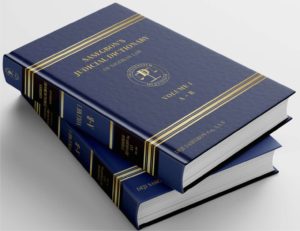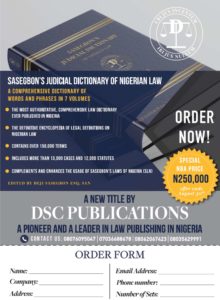Dear Honoured Guests,
Owing to logistical reasons and to ensure your comfort, DSC Publications have found it necessary to change the VENUE of the DEJI SASEGBON SAN Memorial Book Launch of SASEGBON’S JUDICIAL DICTIONARY OF NIGERIAN LAW.

The date and time remain the same: Thursday 14/11/19 at 1pm.
The VENUE IS NOW AGIP HALL, MUSON CENTRE, ONIKAN, LAGOS.
We look forward to your presence at the event to honour Deji Sasegbon’s memory and work. God bless you.
Mrs. Oge Sasegbon
Question of Stare Decisis in International Law: An Examination of The ICJ’s Practice – By Baiyeshea J. Olamide
The common law sailed its way to the shores of many legal jurisdictions across the globe through the instrument of colonization. These many jurisdictions have whole heartedly embraced the common law and all the principles incidental to it particularly the popular doctrine of stare decisis which can be safely said to be one that forms the foundation upon which the common law rests. A non-legal mind or a fresh one who has not come across this doctrine is forced to ask, what is all the fuss about stare decisis? To put simply, the doctrine of stare decisis or judicial precedent simply refers to a system of adjudication in which courts are bound or wont to follow their own decisions or that of courts higher in hierarchy which raise similar questions of law as in the case before them. This system of adjudication started in England and has indeed prospered immensely as it contributes to the expansion of the common law not just in England but also in other countries where the common law has been adopted as the legal system.
Notwithstanding the popularity of this doctrine and its employment in many jurisdictions, there seems to be uncertainty as regards the applicability of the doctrine in the realm of international law and resolution of international legal disputes. The practice of the only judicial arm of the United Nations, the International Court of Justice (ICJ or ‘the court’ or ‘world court’) shall be observed in this write up.
As a way of introduction, The ICJ is established by Article 92 of the United Nations Charter, having both advisory and litigatory jurisdiction, and has a statute governing its functions.The following questions are sought to be answered with regards to the abidingness of this court’s decisions
I. Can the decisions of ICJ in cases be regarded as a source of international law?
II. Can previous decisions of the ICJ be regarded as binding in subsequent cases or international legal disputes?
It is generally taken in the realm of international law that the most authoritative enumeration of the sources of international law can be found within the provisions of the Statute of the International Court of Justice (subsequently referred to as ‘the statute’) and particularly in Article 38. Let us have a view at the said article
The said article provides that the court shall have regard to the following in adjudicating international disputes:
a. International Conventions( general or conventional) establishing rules recognized by the contesting states
b. International custom as evidence of general practice accepted as law
c. General principles of law recognized by civilized nations
d. Subject to Art. 59, judicial decisions and teachings of most highly qualified publicists of the various nations, as subsidiary means for the determination of rules of law.
The implication of the highlighted sub-article (d) of article 38 as reproduced above is that it has made judicial decisions a subsidiary or subordinate instrument in the determination of rules of law within the sphere of international law. Not only that, it has limited its application by making it subject to the provisions of Article 59 of the Statute which provides in essence that the decisions of the court has no binding force except between the parties in respect of whom it was decided and in respect of that particular case. By article 59, only parties to a case are bound by the decision in that case and this does not apply to non-parties to the case and even the same parties in subsequent cases. Thus, the sum up of the provisions of article 38(d) working in concert with Article 59 is the ousting of the doctrine of stare decisis in relation to International law.
Interestingly, this provision is a reproduction of article 38 of the Statute of the Permanent Court of International Justice of 1922. Hence, the Permanent court of International Justice which was the predecessor of the ICJ operated under this rule.
This was made clear in 1973, in what is popularly known as the Fisheries Jurisdiction Case(United Kingdom v. Iceland,1974), where the permanent court held that ‘as a court of law, [it] cannot render judgment sub specie legis ferandae (under pretense of what should be proposed as law) or anticipate the law before the legislator has laid it down.’
In an all-too-similar manner, members of the ICJ have on numerous occasions stated that it is not their role as judges to take the place of the legislator and that they must limit themselves to recording the state of the law. The court has also expressed disinterestedness in following its own precedents in a number of cases. For example, in 1969, in the North Sea Continental Shelf Case, the court ruled for a delimitation of continental shelf in accordance with the ‘equitable principles’, and taking into account all relevant factors. It adopted this same principle in few subsequent cases after that but however departed from it in Libya/Malta,1985 and other subsequent cases by applying the ‘equidistance method’. This pattern of judgments clearly shows unwillingness on the part of the court’s judges to make laws by way of self-reliance.
However, on some occasions, the court tends to tilt towards referring to itself so as to ascertain the consistency of its jurisprudence. An example is provided in the celebrated Cameroon and Nigeria case concerning the sovereignty over Bakassi Peninsula. In that case, Nigeria had opposed an application made by the Cameroon against it having been made few days after the latter had by declaration submitted to the jurisdiction of the ICJ. The Cameroon argued that objection by arguing from a decision of the court in similar circumstances in the 1957 case of Right of Passage over Indian Territory. Nigeria then relied on article 59 and argued that the decision in that case could not be upheld in the extant case against it as by that provision, it did not bind them and that its objection should be upheld. The court agreed with Nigeria to the extent that by reason of article 59, it could not bind Nigeria in a case it had previously decided to which Nigeria was not a party. It however held that the real question was whether there was a reasonable cause to follow its reasoning(s) in its earlier decision and subsequently went further to follow its reasoning in the previous case.
To lay issues to rest, It is apparent that by the joint provisions of Article 38 and 59 of the statute coupled with the attitude of the court towards its past decisions as enumerated above, the rule of stare decisis has been done away with by the ICJ though judicial precedents or decisions constitute a source of international law however secondary in nature. Thus, as an answer to the twin questions posed above, it is taken that the past decisions of the ICJ is not binding but can be regarded as a source of international law to which recourse could be made by the court in subsequent cases.
Baiyeshea John Olamide is a 300 level student of the Faculty of Law, University of Ilorin and currently the Vice President of the International Law Students Association (ILSA), University of Ilorin Chapter.
Deji Sasegbon’s Latest Dictionary: Place your order now. Call:08076095047, 07036688678, 08035629991




Newswire, we present the world of law and the issues that engage them. This edition is yet again, ‘Mind-blowing’. Go get your copy(ies) Now!


Do you need to be heard? Or your articles published? Send your views, messages, articles or press release to: newswiremagazine@yahoo.co.uk >>> We can cover your (LAW) events at the first Call: 08039218044, 08024004726
-Advertisement-
Grab our latest Magazine, "Kelechi Amadi-Obi - Transcending the worlds of Law, Visual Art and Photography". Get your order fast and stress free.
For more details about Newswire Law&Events Magazine, kindly reach out to us on 08039218044, 09070309355. Email: newswiremagazine@yahoo.co.uk. You will be glad you did
Download E-MagazineDo you want to be heard, your events covered, your articles published, or need to advertise your products and services on our Blog and Magazine, reach out to us at Newswire Law and Events, you will be glad you did. For more details about our services, please call: 08039218044, 09070309355. Email: newswiremagazine@yahoo.co.uk








